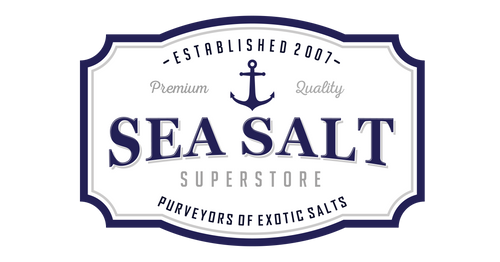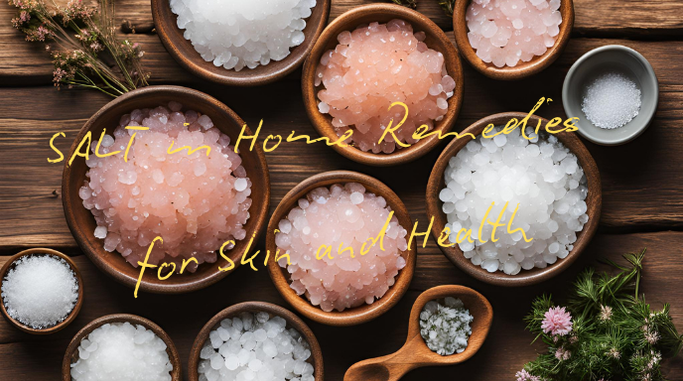Salt is a versatile and inexpensive ingredient that has been used for centuries in various cultures for its healing properties. Whether it’s soothing skin irritations, improving circulation, or promoting detoxification, salt’s natural properties make it a valuable tool for home remedies. Here’s a look at how salt can be used in simple, effective ways to benefit your skin and overall health.
1. Exfoliating Scrubs for Skin
One of the most common ways to use salt in skin care is as an exfoliant. Salt can help remove dead skin cells, leaving your skin feeling soft and rejuvenated. The minerals in salt, such as magnesium and calcium, nourish the skin while scrubbing away impurities.
How to Use:
- DIY Salt Scrub: Mix 1/2 cup of sea salt with 1/4 cup of olive oil or coconut oil. Add a few drops of essential oils like lavender or peppermint for extra relaxation. Gently massage the mixture onto your body in circular motions, focusing on rough areas like elbows, knees, and feet. Rinse off with warm water.
- For Sensitive Skin: If you have sensitive skin, you can use Epsom salt or Himalayan pink salt, which are finer and less abrasive than coarse sea salt. Mix them with honey or yogurt for a soothing effect.
2. Soothing Foot Soaks
Salt foot soaks can be incredibly soothing, especially after a long day. Epsom salt, in particular, is rich in magnesium, which is absorbed through the skin to help relax muscles and reduce inflammation. This makes it an excellent remedy for tired or swollen feet.
How to Use:
- Basic Foot Soak: Dissolve 1/2 cup of Epsom salt in warm water and soak your feet for 15-20 minutes. For added relaxation, you can add a few drops of essential oils like eucalyptus or peppermint.
- For Foot Odor or Fungal Infections: Sea salt has natural antibacterial properties, which can help reduce foot odor and fight minor fungal infections like athlete’s foot. Soak feet in a mixture of 1/2 cup of sea salt and warm water for 15-20 minutes to help prevent infections.
3. Salt Baths for Detox and Relaxation
Taking a bath with salt—especially Epsom salt or Himalayan salt—can have numerous benefits for both your skin and body. Epsom salt is known for its detoxifying properties, as magnesium can help pull toxins from the body while promoting relaxation and stress relief.
How to Use:
- Relaxing Detox Bath: Add 1-2 cups of Epsom salt or Himalayan salt to a warm bath. Soak for 20-30 minutes to help relax sore muscles and encourage detoxification. Adding essential oils like lavender or chamomile can further enhance the soothing effects.
- For Skin Conditions: If you suffer from conditions like eczema or psoriasis, a salt bath can help relieve itching and inflammation. The minerals in salt can help balance the skin’s moisture levels and reduce irritation.
4. Salt Water Gargle for Sore Throat
A saltwater gargle is a time-honored remedy for soothing a sore throat. The salt helps reduce swelling and kills bacteria, offering relief from discomfort caused by infections or irritations.
How to Use:
- Basic Gargle: Mix 1/2 teaspoon of salt in a glass of warm water and gargle for 30 seconds to 1 minute. Repeat several times a day for relief from a sore throat.
- For Additional Benefits: Adding a bit of honey to the saltwater can help soothe the throat even more, as honey has natural antimicrobial properties.
5. Salt for Acne Treatment
Salt has natural antibacterial properties, which make it a helpful ingredient for treating acne and blemishes. Salt can help dry out pimples, absorb excess oil, and prevent further bacterial growth on the skin.
How to Use:
- Salt Water Toner: Mix a teaspoon of sea salt with 1/2 cup of warm water. Apply it to the affected areas with a cotton ball after cleansing your face. This can help reduce acne-causing bacteria and soothe inflammation.
- Spot Treatment: If you have a particularly stubborn pimple, you can apply a small amount of wet sea salt directly onto the blemish. Leave it on for 10-15 minutes before rinsing off. Be cautious if you have sensitive skin, as salt can be drying.
6. Salt as a Natural Deodorant
Salt can be used as a natural alternative to commercial deodorants. Its antibacterial properties help neutralize odor-causing bacteria, making it a safe and effective option for underarm care.
How to Use:
- Salt Deodorant: Wet a salt crystal or a salt block with water and rub it gently under your arms. It will help kill odor-causing bacteria and keep you feeling fresh without chemicals or fragrances.
- For Foot Odor: If you struggle with foot odor, rub a small amount of sea salt on your feet, or soak your feet in a salt bath to neutralize smells.
7. Salt for Healthy Hair
Salt can help promote scalp health by removing excess oils, flakes, and product buildup. This makes it a useful ingredient for exfoliating the scalp and even improving hair volume.
How to Use:
- Scalp Scrub: Mix 1 tablespoon of sea salt with a tablespoon of coconut oil and massage it into your scalp to help exfoliate. Rinse thoroughly and follow with a gentle shampoo to remove buildup and promote healthy scalp circulation.
- Volumizing Shampoo: For hair volume, add a small amount of salt to your regular shampoo. The slight abrasiveness can lift the hair roots and make your hair look fuller.
8. Salt for Sinus Relief
Salt can help relieve sinus congestion by thinning mucus and reducing inflammation. A saline nasal rinse can clear nasal passages and ease breathing.
How to Use:
- Saline Rinse: Mix 1 teaspoon of salt with 1 cup of warm water. Use a neti pot or saline squeeze bottle to irrigate your nasal passages. This can help clear out allergens, mucus, and other debris, providing relief from sinus congestion.
9. Salt as a Natural Insect Repellent
Salt can also act as a mild deterrent for some types of pests, including ants and slugs. If you have a garden, sprinkling salt in areas where these pests are a problem can help keep them away.
How to Use:
- For Slugs and Snails: Sprinkle salt around the perimeter of your garden to deter slugs and snails, which are sensitive to the mineral.
- For Ants: Sprinkle salt around entry points or ant trails to disrupt their paths and keep them from entering your home.
Conclusion
Salt is more than just a kitchen staple; it’s a powerful, natural ingredient that can be used in a variety of home remedies for both skin and health. From soothing foot soaks and detoxifying baths to treating acne and sore throats, salt’s healing properties are broad and effective. Whether you're using it to relax your muscles, exfoliate your skin, or fight off bacteria, salt offers a simple and affordable way to support your overall wellness. As with any home remedy, be sure to use salt in moderation and avoid overuse, particularly in areas where it may cause dryness or irritation.




